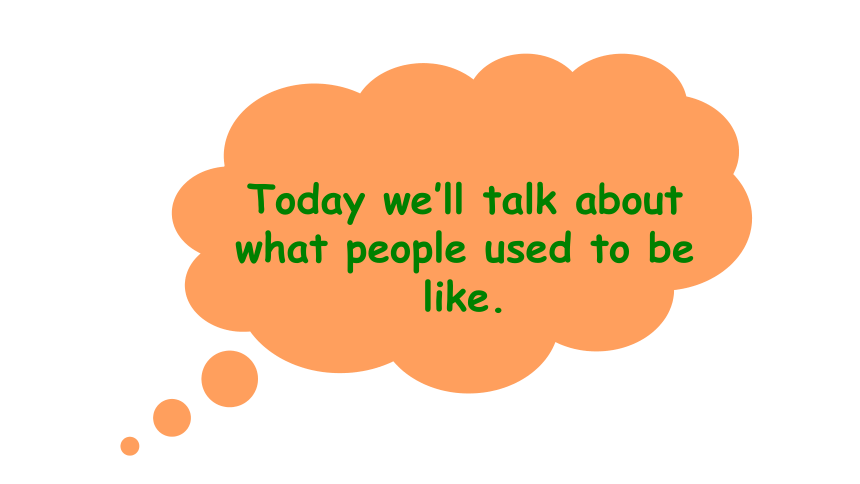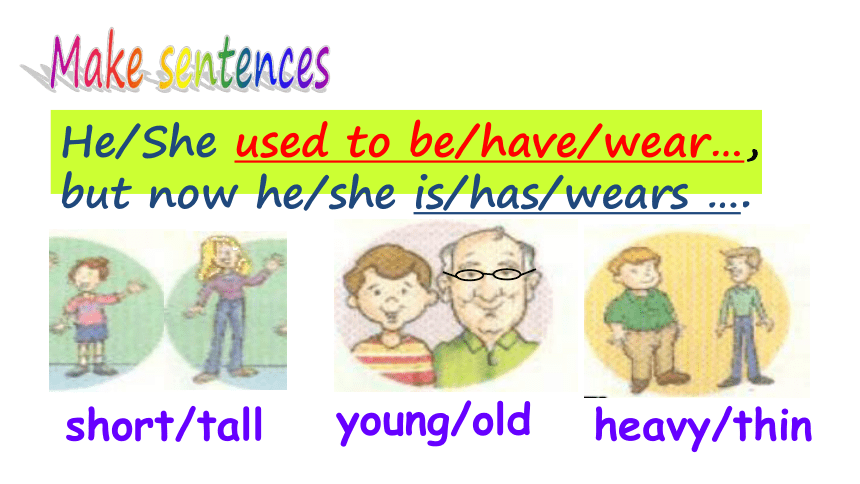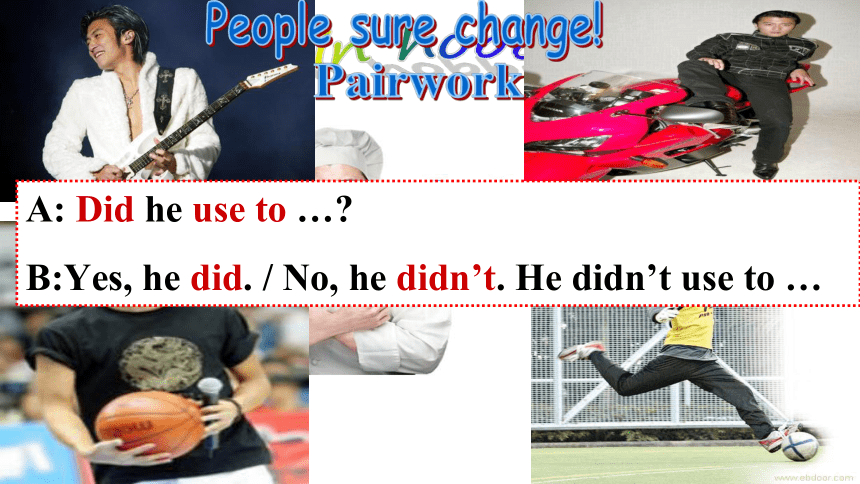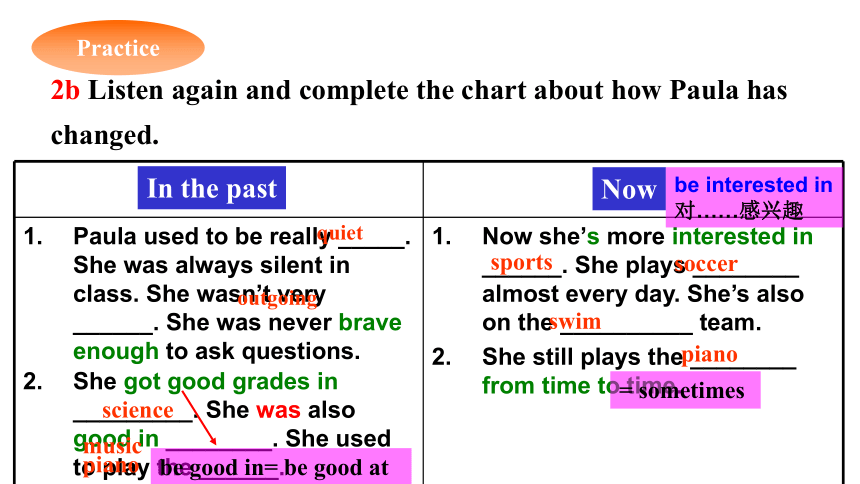Unit4 I used to be afraid of the dark.Section A 2a-2d课件 (共24张PPT)
文档属性
| 名称 | Unit4 I used to be afraid of the dark.Section A 2a-2d课件 (共24张PPT) |  | |
| 格式 | zip | ||
| 文件大小 | 594.6KB | ||
| 资源类型 | 教案 | ||
| 版本资源 | 人教新目标(Go for it)版 | ||
| 科目 | 英语 | ||
| 更新时间 | 2022-08-01 21:22:02 | ||
图片预览









文档简介
(共24张PPT)
Unit 4
I used to be afraid of the dark.
Section A(1a-2d)
Height:
tall
of medium height
short
Build:
heavy
of medium build
thin
have/has two (big) eyes/ears, a small nose…
wear(s) a pair of glasses/a red T-shirt /a school uniform…
long hair
short hair
straight hair
curly hair
blonde hair
brown hair
…
Hair:
Brainstorming: Appearance
have/has
Appearance:
be
be
Personality:
outgoing
funny
friendly
serious
humorous
silent/quiet
shy
mean
brave
helpful
active
…
Someone who helps others a lot.
Today we’ll talk about what people used to be like.
short/tall
young/old
heavy/thin
He/She used to be/have/wear…, but now he/she is/has/wears ….
Make sentences
Change in appearance
A: Did he use to be lovely/ have … / wear…
B: Yes, he did. / No, he didn’t. He didn’t use to be …
A: He is Xie Tingfeng, isn’t he
B: Yes, he is. / No, he isn’t.
反意疑问句
A: He used to have toys, didn’t he
B: Yes, he did. / No, he didn’t.
Change in hobby
A: He used to …, didn’t he
B: Yes, he did. / No, he didn’t. He didn’t use to…
A: Did he use to …
B:Yes, he did. / No, he didn’t. He didn’t use to …
People sure change!
Pairwork
2a Listen and check (√) the words you hear.
√
____ friendly ____ outgoing ____ serious
____ humorous ____ silent ____ active
____ brave ____ quiet ____ helpful
√
√
√
√
√
Paula
Steve
They used to be in the same science class during Grade 8. What did they use to be like?
Practice
Paula used to be really _____. She was always silent in class. She wasn’t very ______. She was never brave enough to ask questions. She got good grades in _________. She was also good in ________. She used to play the ______. Now she’s more interested in ______. She plays ________ almost every day. She’s also on the __________ team.
She still plays the ________ from time to time.
In the past
Now
quiet
outgoing
science
music
piano
sports
soccer
swim
piano
2b Listen again and complete the chart about how Paula has changed.
be good in= be good at
= sometimes
Practice
be interested in 对……感兴趣
Pair work
Paula used to be really quiet.
Make conversations about Paula using the information in 2b.
2c
I know. She was always silent in class.
She wasn’t very outgoing. She was never brave enough to ask questions.
But she was always friendly. She got good grades in exams. And she was really good in music class, too. She used to play the piano.
But now she is more interest in sports. She plays soccer almost every day. She still plays the piano from time to time.
I know, She’s so active now.
2d Read and answer the questions.
They are having a party.
What are they doing
Who are they talking about
What did Billy use to be
They are talking about Billy.
He used to be shy, quiet and thin.
Fill in the blanks
It’s interesting to see how Bill have changed. In the past Now
Personality
Appearance
Everyday actions
Talk to girls
…
shy and quiet
wear glasses /thin
read in the library
His face turned red.
outgoing/popular
big and strong
All the girls are around him.
…
1.This party is such a great idea!
2. It’s been three years since we last saw our primary school classmates
3.His face always turned red when he talked to girls!
4. get good scores on his exams.
Key sentences in 2d:
so good an idea
such a/an adj. + n= so adj. a/an n
例如:如此有趣的一本书/ 如此美味的食物
Past Now
Hair
Height
Build
personality
Hobby/habit
Who has changed the most
Report:
Survey
People sure change! We make a survey about the changes and we found XXX changed the most. He/she used to … … but now he/she … …
知识点
1.He used to be really short. 他过去很矮。
“used to +动词原形” 表示过去的习惯或过去经常反复发生的动作或状态 (现在已经不再存在)。
例: I used to be afraid of the dark.我过去怕黑(现在不怕了)。
He used to like playing games.他过去喜欢玩游戏(现在不喜欢了)。
日常口语中,句型转换常用助动词did,例如:
You used to be short.
He used to play tennis.
Did you use to be short
He used to play tennis,didn’t he
Yes, he did.
No, he didn’t
be (get/become) used to doing sth 该词组的含义是“习惯于……”。这里的to是介词,后面不能接动词原形,而要接名词或v-ing形式。
例:They are used to the hard work here now.
他们现在习惯于这里的艰苦工作了。
I’m used to dealing with matters of this kind.
我习惯于处理这类事情。
sth
“be used to do ”被用来做某事(被动语态)。
例:Wood is used to make paper .
木头被用来造纸。
Computers are used to do many things for people .
电脑是用来为人们做许多事情。
You used to be quiet, didn’t you 你以前很静的,是不是
反意疑问句: 陈述句, 动词+主语 肯定/否定 否定/肯定
练习: He is a student, _______________
He isn’t a student,______________
He likes basketball, _____________
They’ll go to Beijing tomorrow,______________
Your mother can’t swim ,____________
Tom has had his supper,___________
Li Ping is playing football,_____________
He went to school yesterday, __________
isn’t he
is he
doesn’t he
won’t they
can she
hasn’t he
isn’t he
didn’t he
用used to, be used to ,get used to, be used for 填空
1.Mr Black be a bus driver, but now he is a bank clerk.
2.The pen writing.
3.My father drinking coffee after dinner.
4.This machine ___________________ make bread.
(机器)
used to
is used for
gets used to
is used to (被用来做…)
such与so 辨析:
such为形容词,意为“这(那)样的;主要修饰名词;
so是副词,意为“这(那)么;如此地”,主要修饰形容词、副词和分词。
2. This party is such a great idea!
这个派对真是个好主意!
He used to be so shy and quiet.
他过去非常害羞安静。
当名词前有many,much,few或little等词修饰时,要用so而不用such。
例: There are so many / few people in the hall.
大厅有这么多/这么少的人。
You have so much / little homework today.
你今天有这么多/这么少的作业。
“such + a / an +形容词+可数名词单数形式”相当于“so +形容词+a / an +可数名词单数形式”,表示“如此……的一个……”。
例: She is such a lovely girl. = She is so lovely a girl.
她是这个如此可爱的女孩。
Unit 4
I used to be afraid of the dark.
Section A(1a-2d)
Height:
tall
of medium height
short
Build:
heavy
of medium build
thin
have/has two (big) eyes/ears, a small nose…
wear(s) a pair of glasses/a red T-shirt /a school uniform…
long hair
short hair
straight hair
curly hair
blonde hair
brown hair
…
Hair:
Brainstorming: Appearance
have/has
Appearance:
be
be
Personality:
outgoing
funny
friendly
serious
humorous
silent/quiet
shy
mean
brave
helpful
active
…
Someone who helps others a lot.
Today we’ll talk about what people used to be like.
short/tall
young/old
heavy/thin
He/She used to be/have/wear…, but now he/she is/has/wears ….
Make sentences
Change in appearance
A: Did he use to be lovely/ have … / wear…
B: Yes, he did. / No, he didn’t. He didn’t use to be …
A: He is Xie Tingfeng, isn’t he
B: Yes, he is. / No, he isn’t.
反意疑问句
A: He used to have toys, didn’t he
B: Yes, he did. / No, he didn’t.
Change in hobby
A: He used to …, didn’t he
B: Yes, he did. / No, he didn’t. He didn’t use to…
A: Did he use to …
B:Yes, he did. / No, he didn’t. He didn’t use to …
People sure change!
Pairwork
2a Listen and check (√) the words you hear.
√
____ friendly ____ outgoing ____ serious
____ humorous ____ silent ____ active
____ brave ____ quiet ____ helpful
√
√
√
√
√
Paula
Steve
They used to be in the same science class during Grade 8. What did they use to be like?
Practice
Paula used to be really _____. She was always silent in class. She wasn’t very ______. She was never brave enough to ask questions. She got good grades in _________. She was also good in ________. She used to play the ______. Now she’s more interested in ______. She plays ________ almost every day. She’s also on the __________ team.
She still plays the ________ from time to time.
In the past
Now
quiet
outgoing
science
music
piano
sports
soccer
swim
piano
2b Listen again and complete the chart about how Paula has changed.
be good in= be good at
= sometimes
Practice
be interested in 对……感兴趣
Pair work
Paula used to be really quiet.
Make conversations about Paula using the information in 2b.
2c
I know. She was always silent in class.
She wasn’t very outgoing. She was never brave enough to ask questions.
But she was always friendly. She got good grades in exams. And she was really good in music class, too. She used to play the piano.
But now she is more interest in sports. She plays soccer almost every day. She still plays the piano from time to time.
I know, She’s so active now.
2d Read and answer the questions.
They are having a party.
What are they doing
Who are they talking about
What did Billy use to be
They are talking about Billy.
He used to be shy, quiet and thin.
Fill in the blanks
It’s interesting to see how Bill have changed. In the past Now
Personality
Appearance
Everyday actions
Talk to girls
…
shy and quiet
wear glasses /thin
read in the library
His face turned red.
outgoing/popular
big and strong
All the girls are around him.
…
1.This party is such a great idea!
2. It’s been three years since we last saw our primary school classmates
3.His face always turned red when he talked to girls!
4. get good scores on his exams.
Key sentences in 2d:
so good an idea
such a/an adj. + n= so adj. a/an n
例如:如此有趣的一本书/ 如此美味的食物
Past Now
Hair
Height
Build
personality
Hobby/habit
Who has changed the most
Report:
Survey
People sure change! We make a survey about the changes and we found XXX changed the most. He/she used to … … but now he/she … …
知识点
1.He used to be really short. 他过去很矮。
“used to +动词原形” 表示过去的习惯或过去经常反复发生的动作或状态 (现在已经不再存在)。
例: I used to be afraid of the dark.我过去怕黑(现在不怕了)。
He used to like playing games.他过去喜欢玩游戏(现在不喜欢了)。
日常口语中,句型转换常用助动词did,例如:
You used to be short.
He used to play tennis.
Did you use to be short
He used to play tennis,didn’t he
Yes, he did.
No, he didn’t
be (get/become) used to doing sth 该词组的含义是“习惯于……”。这里的to是介词,后面不能接动词原形,而要接名词或v-ing形式。
例:They are used to the hard work here now.
他们现在习惯于这里的艰苦工作了。
I’m used to dealing with matters of this kind.
我习惯于处理这类事情。
sth
“be used to do ”被用来做某事(被动语态)。
例:Wood is used to make paper .
木头被用来造纸。
Computers are used to do many things for people .
电脑是用来为人们做许多事情。
You used to be quiet, didn’t you 你以前很静的,是不是
反意疑问句: 陈述句, 动词+主语 肯定/否定 否定/肯定
练习: He is a student, _______________
He isn’t a student,______________
He likes basketball, _____________
They’ll go to Beijing tomorrow,______________
Your mother can’t swim ,____________
Tom has had his supper,___________
Li Ping is playing football,_____________
He went to school yesterday, __________
isn’t he
is he
doesn’t he
won’t they
can she
hasn’t he
isn’t he
didn’t he
用used to, be used to ,get used to, be used for 填空
1.Mr Black be a bus driver, but now he is a bank clerk.
2.The pen writing.
3.My father drinking coffee after dinner.
4.This machine ___________________ make bread.
(机器)
used to
is used for
gets used to
is used to (被用来做…)
such与so 辨析:
such为形容词,意为“这(那)样的;主要修饰名词;
so是副词,意为“这(那)么;如此地”,主要修饰形容词、副词和分词。
2. This party is such a great idea!
这个派对真是个好主意!
He used to be so shy and quiet.
他过去非常害羞安静。
当名词前有many,much,few或little等词修饰时,要用so而不用such。
例: There are so many / few people in the hall.
大厅有这么多/这么少的人。
You have so much / little homework today.
你今天有这么多/这么少的作业。
“such + a / an +形容词+可数名词单数形式”相当于“so +形容词+a / an +可数名词单数形式”,表示“如此……的一个……”。
例: She is such a lovely girl. = She is so lovely a girl.
她是这个如此可爱的女孩。
同课章节目录
- Unit 1 How can we become good learners.
- Section A
- Section B
- Unit 2 I think that mooncakes are delicious!
- Section A
- Section B
- Unit 3 Could you please tell me where the restroom
- Section A
- Section B
- Unit 4 I used to be afraid of the dark.
- Section A
- Section B
- Unit 5 What are the shirts made of?
- Section A
- Section B
- Review of Units 1-5
- Unit 6 When was it invented?
- Section A
- Section B
- Unit 7 Teenagers should be allowed to choose their
- Section A
- Section B
- Unit 8 It must belong to Carla.
- Section A
- Section B
- Unit 9 I like music that I can dance to.
- Section A
- Section B
- Unit 10 You're supposed to shake hands.
- Section A
- Section B
- Review of Units 6-10
- Unit 11 Sad movies make me cry.
- Section A
- Section B
- Unit 12 Life is full of the unexpected
- Section A
- Section B
- Unit 13 We're trying to save the earth!
- Section A
- Section B
- Unit 14 I remember meeting all of you in Grade 7.
- Section A
- Section B
- Review of Units 11-14
